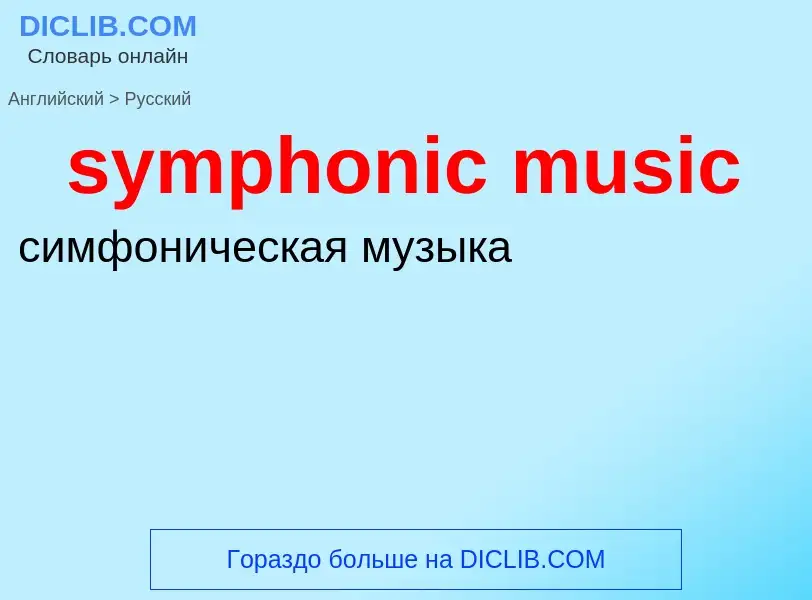Tradução e análise de palavras por inteligência artificial ChatGPT
Nesta página você pode obter uma análise detalhada de uma palavra ou frase, produzida usando a melhor tecnologia de inteligência artificial até o momento:
- como a palavra é usada
- frequência de uso
- é usado com mais frequência na fala oral ou escrita
- opções de tradução de palavras
- exemplos de uso (várias frases com tradução)
- etimologia
symphonic music - tradução para russo
Definição
Wikipédia
.jpg?width=120)
An orchestra (; OR-ki-strə) is a large instrumental ensemble typical of classical music, which combines instruments from different families. There are typically four main sections of instruments:
- bowed string instruments, such as the violin, viola, cello, and double bass
- woodwinds, such as the flute, oboe, clarinet, saxophone, and bassoon
- brass instruments, such as the horn, trumpet, trombone, cornet, and tuba
- percussion instruments, such as the timpani, snare drum, bass drum, cymbals, triangle, tambourine, and mallet percussion instruments
Other instruments such as the piano, harpsichord, and celesta may sometimes appear in a fifth keyboard section or may stand alone as soloist instruments, as may the concert harp and, for performances of some modern compositions, electronic instruments and guitars.
A full-size Western orchestra may sometimes be called a symphony orchestra or philharmonic orchestra (from Greek phil-, "loving", and "harmony"). The actual number of musicians employed in a given performance may vary from seventy to over one hundred musicians, depending on the work being played and the size of the venue. A chamber orchestra (sometimes concert orchestra) is a smaller ensemble of not more than about fifty musicians. Orchestras that specialize in the Baroque music of, for example, Johann Sebastian Bach and George Frideric Handel, or Classical repertoire, such as that of Haydn and Mozart, tend to be smaller than orchestras performing a Romantic music repertoire such as the symphonies of Ludwig van Beethoven and Johannes Brahms. The typical orchestra grew in size throughout the 18th and 19th centuries, reaching a peak with the large orchestras (of as many as 120 players) called for in the works of Richard Wagner, and later, Gustav Mahler.
Orchestras are usually led by a conductor who directs the performance with movements of the hands and arms, often made easier for the musicians to see by use of a short metal rod known as a conductor's baton. The conductor unifies the orchestra, sets the tempo and shapes the sound of the ensemble. The conductor also prepares the orchestra by leading rehearsals before the public concert, in which the conductor provides instructions to the musicians on their interpretation of the music being performed.
The leader of the first violin section – commonly called the concertmaster – also plays an important role in leading the musicians. In the Baroque music era (1600–1750), orchestras were often led by the concertmaster, or by a chord-playing musician performing the basso continuo parts on a harpsichord or pipe organ, a tradition that some 20th century and 21st century early music ensembles continue. Orchestras play a wide range of repertoire, including symphonies, opera and ballet overtures, concertos for solo instruments, and as pit ensembles for operas, ballets, and some types of musical theatre (e.g., Gilbert and Sullivan operettas).
Amateur orchestras include those made up of students from an elementary school or a high school, youth orchestras, and community orchestras; the latter two typically being made up of amateur musicians from a particular city or region.
The term orchestra derives from the Greek ὀρχήστρα (orchestra), the name for the area in front of a stage in ancient Greek theatre reserved for the Greek chorus.

.jpg?width=200)

![8th Symphony]] 8th Symphony]]](https://commons.wikimedia.org/wiki/Special:FilePath/Philadelphia Orchestra at American premiere of Mahler's 8th Symphony (1916).jpg?width=200)
![NTNU Symphony Orchestra]] in Taipei, Republic of China NTNU Symphony Orchestra]] in Taipei, Republic of China](https://commons.wikimedia.org/wiki/Special:FilePath/Taipei.apo-hsu.altonthompson.jpg?width=200)
